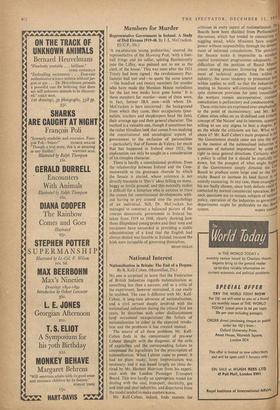Members for Murder
Representative Government in Ireland: A Study of Dail Eireann 1919-48. By J. L. McCracken. (G.U.P., 30s.)'
'A DILAPIDATED young proletarian,' sneered the representative of the Morning Poo, 'with a foot- ball fringe and no collar, spitting flamboyantly into the Liffey, was pointed out to me as the clerk of the house.' This was soon after the 1921 Treaty had been signed : the revolutionary Par- liament had met and—to quote the same source =the hundred and twenty members for murder who have made the Mansion House melodious for the last two weeks have gone home.' It is these members for murder—most of them were, in fact, former IRA men—with whom Dr. McCracken is here concerned : the background from which they came, their occupations (jour- nalists, teachers and shopkeepers head the lists), their average age and their general character. The method is a valuable one, though it sometimes has the rather bloodless look that comes from studying the constitutional and sociological aspects of government to the exclusion of personalities —particularly that of Eamon de Valera; for much that has happened in Ireland since 1921, the explanation can only be sought in a consideration of his complex character.
There is hardly a constitutional problem, from the relationship between Ireland and the Com- monwealth to the grotesque charade by which the Senate is elected, whose existence is not directly traceable to `Dev's' ideas falling on stony, boggy or fertile ground; and this naturally makes it difficult for a historian who is anxious to trace the causes for constitutional developments with- out having to pry around into the psychology of an individual. Still, Dr. McCracken has managed to construct a balanced picture of the courses democratic government in Ireland has taken from 1919 to 1948, clearly showing how those dilapidated younrproles and their sons and successors have succeeded in providing a stable administration of a kind that the English had always denied was feasible in Ireland, because the Irish were incapable of governing themselves.
BRIAN INGLIS






































 Previous page
Previous page